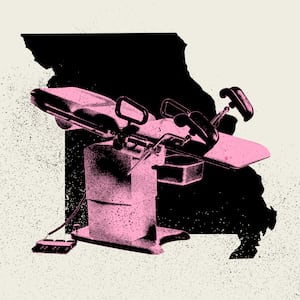Robin Marty, the operations director for a west Alabama abortion clinic, was on a live television interview when she learned that the Supreme Court had overturned Roe v. Wade.
Marty hastily excused herself and called her staff to deliver the devastating news: that they would have to send home all the patients in the waiting room. Alabama is one of 22 states with laws in place to ban abortion now that Roe is moot, and the West Alabama Women's Center would cease providing the service for the foreseeable future.
“After that, all of my staff went home,” Marty told The Daily Beast. “They’re all trying to process.”
Abortion services ground to a halt around the country Friday after the Supreme Court overturned Roe, sending the choice of whether to outlaw abortion or leave it legal back to the states.
All three Planned Parenthood affiliates in Texas said they would cease providing abortions in the state Friday, after Attorney General Ken Paxton warned that prosecutors could immediately pursue charges against providers who violate a pre-Roe abortion ban still on the books. Whole Woman’s Health, which operates four clinics in the state, also stopped offering the service. And the Lilith Fund, one of the largest abortion funds in the state, said it would pause funding for abortions while it considered the implication of the decision.
The founder of Whole Woman’s Health, Amy Hagstrom Miller, said her clinics called hundreds of patients Friday to cancel their appointments. Some asked to be put on a waiting list in case the clinics reopened, she said, but it was unclear when that would be possible.
“As of today there are no abortions being provided in the state of Texas by Whole Woman’s Health Clinics, or anyone else,” she said on a call, adding: “I don’t think it’s possible to overstate the damage this will cause in the lives of millions of people.”

Amy Hagstrom Miller, founder and CEO of Whole Woman's Health
Drew Angerer/GettyPlanned Parenthood also suspended operations in Wisconsin, turning away abortion-seekers in the waiting room right after the decision came down. And in Louisiana, where a law on the books immediately banned most abortions once Roe was overturned, all three clinics ceased operations, making it virtually impossible for the more than 900,000 women of reproductive age to get care in their home state.
Clinics in Oklahoma and South Dakota had already stopped accepting patients earlier this week, in advance of the decision.
The closures were caused by a slate of so-called “trigger bans” that could ban abortion in 13 states now that Roe is history, and by pre-Roe laws still on the books in another nine states. Only three states—South Dakota, Louisiana, and Kentucky—were poised to immediately make abortion illegal following the Supreme Court ruling. But clinics in other states, such as Wisconsin and Texas, started turning away patients immediately out of an abundance of caution.
“We all believe that this pause in abortion care, while heartbreaking, is the best way to protect our staff and patients and ensure we remain a strong, viable organization providing healthcare in the years to come,” Jeffery Hons, president of Planned Parenthood of South Texas, said on a call.
The rapidity with which these laws can take effect played out in Alabama. Hours after Marty made the call to empty the waiting room, the Alabama attorney general announced that all laws banning abortion in the state were now in full effect. He warned all abortion clinics and providers in the state to “immediately cease and desist operations.” That evening, a federal judge officially lifted the 2019 injunction blocking the state’s abortion ban from going into effect.
So Marty and her team began calling the 100 or so patients scheduled for abortions next week, letting them know their appointments were canceled, too. They directed them to a fund the clinic set up in advance of the decision, which could help them acquire abortions outside the state.
But, Marty added, “the reality is that some of those patients will not get abortions.”
“I can tell you that at least one [of those] patients will not be able to leave the state for a variety of reasons, and that patients will be forced to give birth,” she said.
The clinic to which the WAWC is directing most patients is in Georgia, which has a pending six-week abortion ban likely to take effect soon due to the Supreme Court action. The director of that clinic, the Feminist Women’s Health Center in Atlanta, said the clinic would continue providing care, but noted that her patients were already struggling to afford the transportation, time off, and childcare required to travel across state lines for the procedure.
Many abortion rights advocates suggested donating to abortion funds for just this reason. An increasingly popular method of supporting abortion-seekers, the funds provide monetary assistance to help pay for the procedure and other costs surrounding it. The National Network of Abortion Funds, which represents more than 80 such funds around the country, told The Daily Beast it had received $2 million in donations from 23,000 donors by Friday afternoon.
Other reproductive rights groups called on Congress to pass a law enshrining the right to an abortion nationwide, and asked the Biden administration to take whatever action it has available to shore up reproductive rights. Hagstrom Miller said Whole Woman’s Health is looking to open more clinics in states where abortion is protected and had asked the Biden administration for help in doing so.
For now, Hagstrom Miller said, their clinics in Virginia, Maryland, and Minnesota were still open and accepting patients.
“Whole Woman's Health is here for you. We are not going away ever,” she said. “We will not stop fighting until our full rights and access to the care we all need has been fully restored.”







